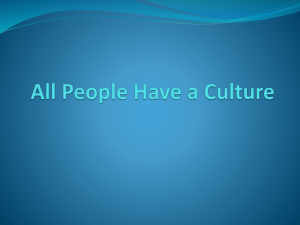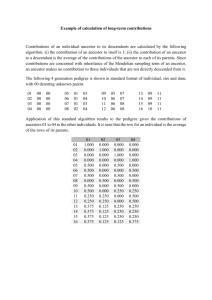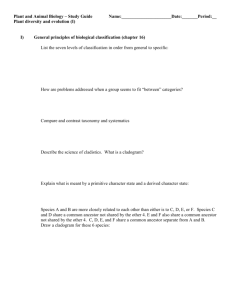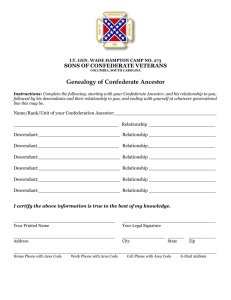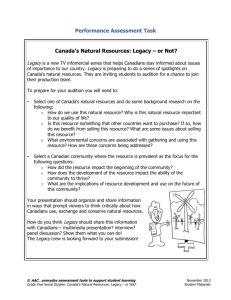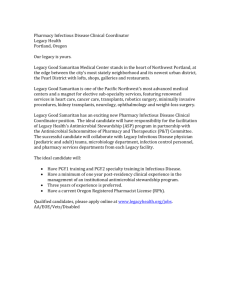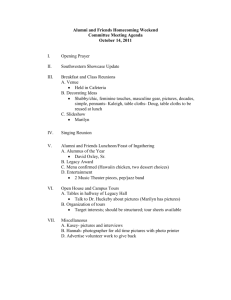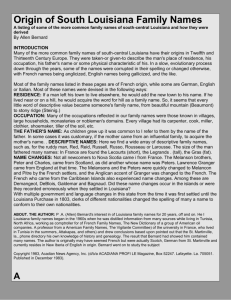DOC
advertisement
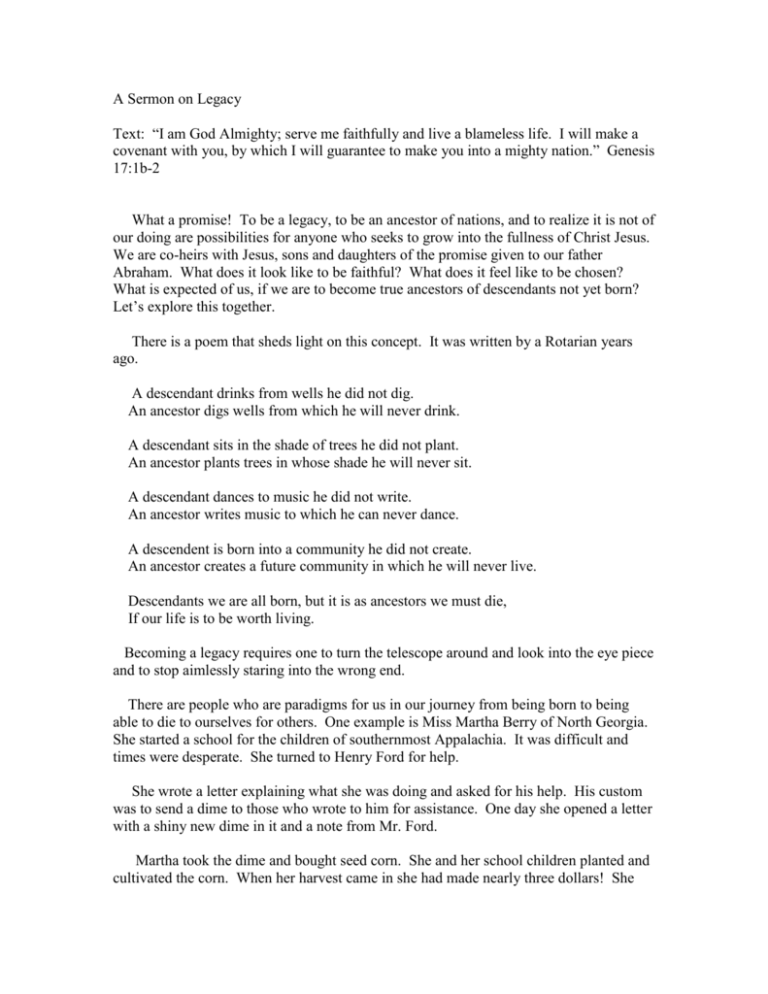
A Sermon on Legacy Text: “I am God Almighty; serve me faithfully and live a blameless life. I will make a covenant with you, by which I will guarantee to make you into a mighty nation.” Genesis 17:1b-2 What a promise! To be a legacy, to be an ancestor of nations, and to realize it is not of our doing are possibilities for anyone who seeks to grow into the fullness of Christ Jesus. We are co-heirs with Jesus, sons and daughters of the promise given to our father Abraham. What does it look like to be faithful? What does it feel like to be chosen? What is expected of us, if we are to become true ancestors of descendants not yet born? Let’s explore this together. There is a poem that sheds light on this concept. It was written by a Rotarian years ago. A descendant drinks from wells he did not dig. An ancestor digs wells from which he will never drink. A descendant sits in the shade of trees he did not plant. An ancestor plants trees in whose shade he will never sit. A descendant dances to music he did not write. An ancestor writes music to which he can never dance. A descendent is born into a community he did not create. An ancestor creates a future community in which he will never live. Descendants we are all born, but it is as ancestors we must die, If our life is to be worth living. Becoming a legacy requires one to turn the telescope around and look into the eye piece and to stop aimlessly staring into the wrong end. There are people who are paradigms for us in our journey from being born to being able to die to ourselves for others. One example is Miss Martha Berry of North Georgia. She started a school for the children of southernmost Appalachia. It was difficult and times were desperate. She turned to Henry Ford for help. She wrote a letter explaining what she was doing and asked for his help. His custom was to send a dime to those who wrote to him for assistance. One day she opened a letter with a shiny new dime in it and a note from Mr. Ford. Martha took the dime and bought seed corn. She and her school children planted and cultivated the corn. When her harvest came in she had made nearly three dollars! She wrote up her story and sent it back to Mr. Ford with his dime. She thanked him and assured him he had encouraged her. Henry Ford already had a place at Richmond Hill, Georgia, so he was not a complete foreigner to the state of Georgia. On his next trip down he made it his business to meet this hard scrabble little lady. The result of their collaboration was Martha Berry College built in Rome, Georgia. It is the largest college geographically in America at 27,000 acres. When Henry showed her the land, she looked straight ahead and saw maybe a hundred acres. She was excited and thanked him. It was then he said, “You can’t see all the land at once. Look over there. See that mountain in the distance? Your land goes all the way to it!” Every building was built in the first phase by Mr. Ford of granite stones. They still stand there today. Legacies have a way of enlisting others and getting their best out of them. Times have changed. In the past a person’s date of death was recognized. It was then that the truth about their life could be told. When one was born was not celebrated. Today one’s birthday is all important. It is enough for some folks that they were born! Let the celebration begin! But this is counter-productive. We are gardens that need weeding, not flowers that seek to bloom. Left to our selves, or to too soon celebrations of our self; we go to weeds and briars, not fruit and flowers. The General, who landed in England with the 8th Army Air early in WW II, was invited to a celebration of their arrival. When called upon he said, “I not going to do a lot of talking until we have done some fighting. When we are gone, I hope you will be glad we came.” He understood that a legacy is not about “seeming to be” rather it is about “being.” We over estimate what we can do in a year and horribly under estimate what we can do in ten years. What about even longer views into the future? The American Indians of the western plains had as a part of their ancient wisdom the vision to not decide about anything important as a tribe until they could answer this question. “Will this be a good decision ten generations from now?” If the answer was no, they did not proceed. On of the great universities in England built a dining hall in the middle 1600s. They cut a stand of might oaks and used them to cover the floors and walls. It was beautiful and generations were educated there and found fellowship around the massive oaken tables with their fellow students. In the middle of the twentieth century the old hall had run its course. The life was out of the ancient wood and the need to replace it was upon them. They wanted to keep faith with the original architect’s vision, so they returned to his plans which were in the library’s archive. There, untouched for nearly 400 years, was a note written on the plats. The oaks used to build this hall were harvested a half mile into our property near the small lake to the south. After we harvested and built the hall, we replanted the same variety of oaks on the site. If you are looking at this plat, it is obviously time to rebuild the dining hall. The trees should be ready for your restoration.” And they were! Planning for 400 years into the future for a legacy is remarkable. Reminds me of Joseph saying, “When you leave Egypt, don’t leave my bones behind. Bury me in the promised land.” Who at that time thought they would ever leave Egypt? In 1632 a small Dutch Reformed Church was built in New York City. It was called marble Collegiate Church. Shortly after forming they established a Benevolence Fund. It was before Foundations and Endowments were even a gleam in anyone’s eye. The Rev. Dr. Arthur Calliandro was the minister there in the early 1990s. He came and preached a revival at Waycross First UMC. He was the minister who followed Dr. Norman V. Peale. He told this story about a 300 year old vision for the future of Marble Collegiate. There came a time when the Benevolence Fund had grown strong and had done so many marvelous ministries and served so many missions that the trustees were looking for opportunities. One Sunday the chairperson spoke to the congregation. “Today we are able to report that it is our intention to underwrite the expenses of marble Collegiate Church each year from our Benevolence Fund. There is one caveat. The purpose in doing this is to free up 100% of the tithes and offerings to be administered in missions. If the giving drops because of the underwriting, we will sadly withdraw our commitment. I believe this is the hope of all who have ever given to our fund.” Marble Collegiate celebrated and cried and never looked back. Giving, now totally for other, ascended to heaven as sweet smelling incense to the Lord God. Finally, when we take God as a partner, our plans are always too small. Who can see what he can? Who can imagine what He purposes? The old Hebrew saying is true on many levels: “He who plants wheat plants for himself. He who plants grapes plants for his children. But he who plants olives plants for generations yet unborn.” We cannot live by bread alone any more than we can be a great nation of descendants. What will your legacy be? Our Legacy be? What is God asking our Legacy to be? Amen Rev. Buddy Cooper
